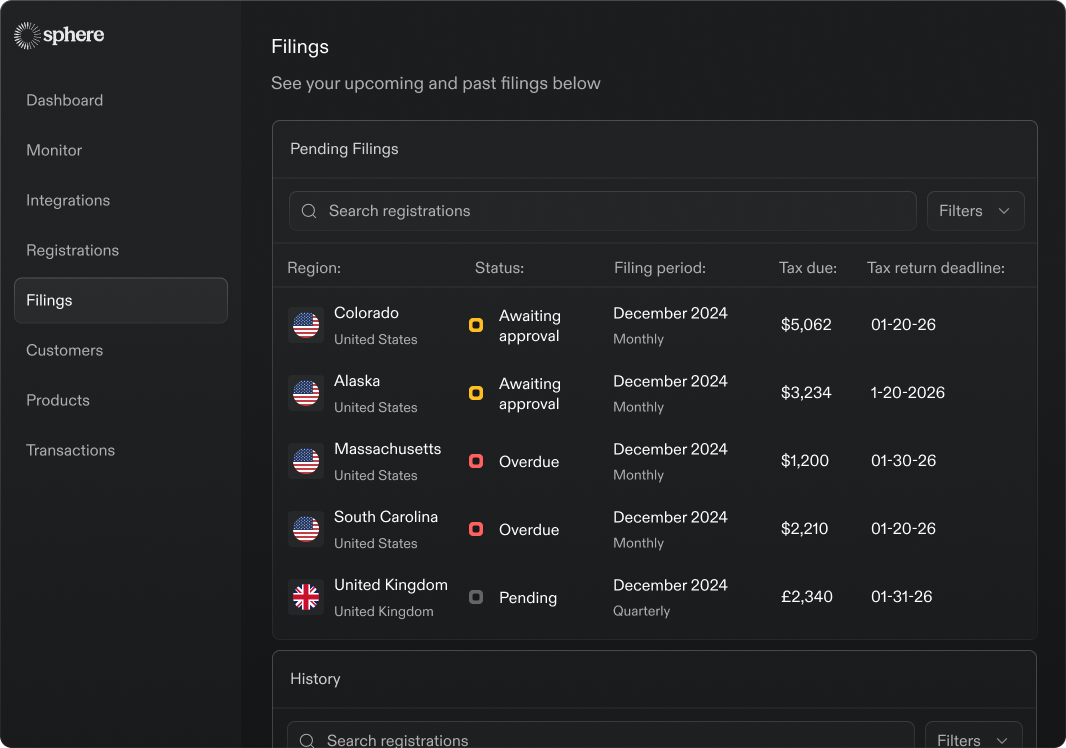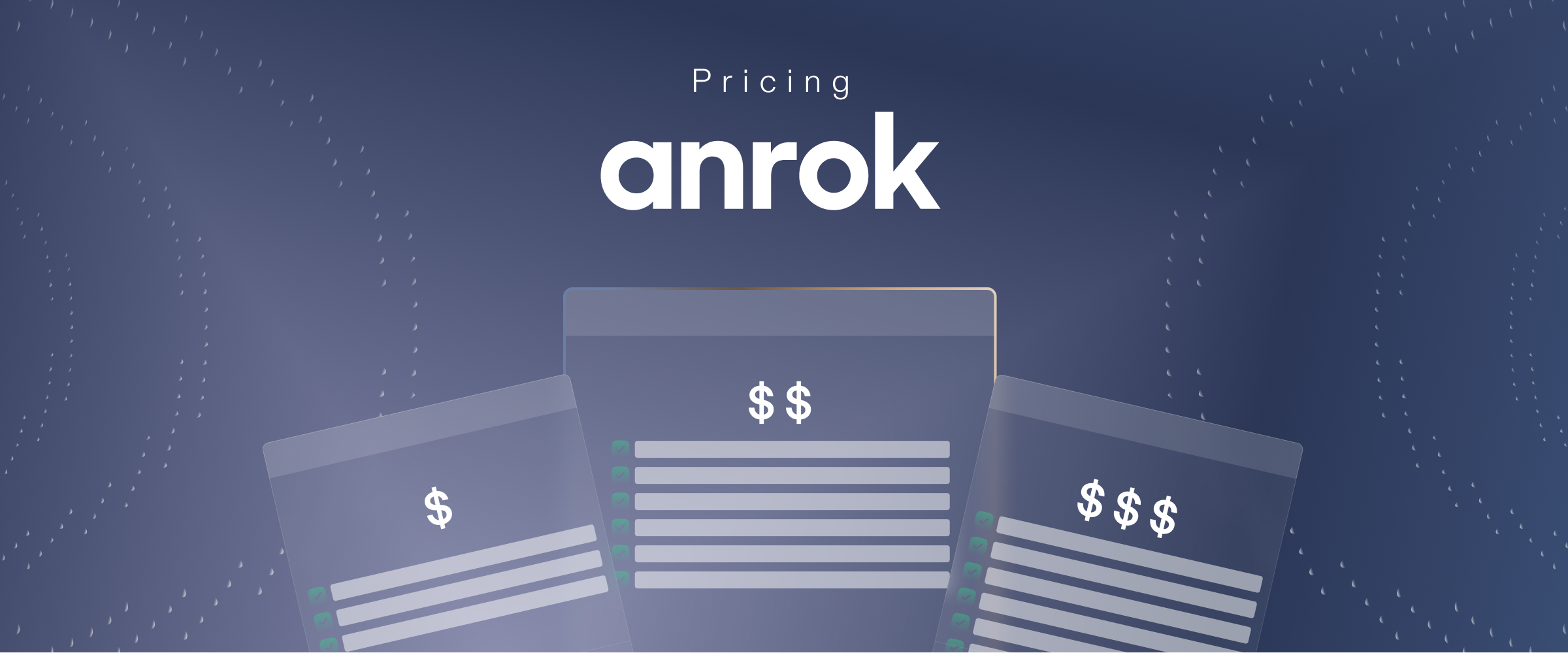.png)
SaaS businesses must comply with dozens of regulatory requirements, including state sales tax laws. If your SaaS company does business in Florida, you must understand how SaaS digital products are taxed.
This article explains when SaaS sales are taxable in Florida, what Florida nexus rules require, and how to stay compliant, even if no SaaS sales tax is due.
As the SaaS industry grows, SaaS taxes will become a bigger and more complex issue. If, for example, you start operating in 12 new states, you need to understand how sales tax on SaaS products is charged in each state. Fortunately, Sphere’s AI-enabled platform manages sales tax compliance with ease.
Is SaaS Taxable in Florida?
Tax regulations in Florida depend on how you deliver your SaaS to customers and if the sale requires tangible personal property.
The short answer
The first thing to know is that Florida’s tax policy treats tangible and intangible property differently. The state does not tax intangible services but tangible personal property is taxed.
Florida does not tax SaaS when it’s delivered electronically — this includes web-based software and cloud applications. There is no sales or use tax on software unless the SaaS product is delivered on physical media (CD, USB, etc.).
You must support SaaS customers by providing setup, configuration, and support services. These services are generally not taxable if no tangible personal property is transferred.
Florida’s Legal Definition
The Florida Department of Revenue’s Technical Assistance Advisement (TAA)16A-014 explains how the state taxes SaaS software.
The Florida tax code imposes sales tax only on tangible personal property and certain enumerated services. Electronically delivered software doesn’t meet this definition and is considered non-taxable. In addition, custom or remotely installed software is exempt if the software is not delivered on physical media.
How SaaS is Taxed in Other States
The 2018 US Supreme Court ruling in South Dakota v. Wayfair, Inc. added complexity to sales tax obligations. The ruling allows states to require out-of-state sellers to collect sales tax. Sales tax may be required even if the seller does not have a physical presence in the state.
It’s no surprise that many states now tax out-of-state sellers. States have different sales tax policies and tax businesses at different rates. This information is taken from the Tax Foundation’s 2024 report:
- Forty-five states and the District of Columbia charge sales tax.
- Local sales taxes are collected in 38 states.
- Louisiana, Tennessee, Arkansas, Washington, and Alabama have the highest average combined state and local sales tax rate (over 9% in each state).
The cost of tax compliance will grow as a business scales and must comply with multiple state and local laws.
Monitoring — What Triggers Tax Obligations
The term “nexus” refers to a connection between a business and a state or local government. Nexus may exist based on a specific level of sales, number of customers, or because the business has a physical location in the state. Nexus requires the business to collect and remit sales tax on sales within the state.
Economic nexus
Florida’s economic nexus is more than $100,000 in taxable sales made during the previous calendar year. If the $100,000 threshold is exceeded, you must register with the state and start collecting sales tax.
As explained above, SaaS computer software delivered electronically that does not involve tangible personal property is not a taxable sale. If your company sells both SaaS and taxable products, only the taxable portion is considered in the economic nexus calculation.
Here’s an example: You operate a SaaS business in California and do not have a physical presence in Florida. If you generate $150,000 in taxable sales during the previous calendar year, you must register in Florida and start collecting sales tax.
Keep in mind that taxable sales do not include SaaS delivered electronically, including web-based software and cloud applications. A SaaS product delivered on physical media (CD, USB, etc.) is included in taxable sales.
Physical nexus
Any physical presence in Florida, such as an office, employees, contractors, or inventory, creates physical nexus. Physical nexus triggers a requirement to register, collect taxes, and file sales tax returns. The rule applies, even if your SaaS sales are non-taxable.
City-level tracking
The term “home rule” means that state law grants local municipalities autonomy to set local filing thresholds for taxes. Florida law does not provide local municipalities with this authority. All state tax monitoring and filing is done at the state level only, making compliance more centralized.
Sphere still monitors state-level thresholds and exemptions to ensure your business doesn’t miss a registration trigger.
Registration — Who You Register With and When
A state’s Department of Revenue typically manages sales tax reporting, and many states automate the process.
Florida Department of Revenue (DOR)
Here’s how to register with the state to collect and pay sales tax:
- Create an account on the Florida DOR website before applying for a sales and use tax certificate.
- Complete the online application process.
- After applying, you’ll be notified by email once your certificate is issued. Processing time typically takes 1 to 2 weeks.
Note that the registration process is the same for both in-state and out-of-state sellers. There are no extra steps for remote businesses.
Calculation — Figure Out the Right Rates
SaaS companies operating in Florida may pay state sales tax and discretionary sales surtaxes assessed by counties.
State tax rate (for SaaS = 0%)
Florida’s sales tax rate is 6%, but the tax rate does not apply to SaaS delivered electronically. SaaS is treated as a non-taxable intangible service, so no state sales tax is charged.
Local tax rates vary
Florida counties may impose a discretionary sales surtax, which can range from 0% to 2.5%. These local surtaxes apply only to taxable items, so SaaS is generally exempt at the local level.
Local tax rates are similar to state tax rates. If your business sells both taxable and non-taxable items, local surtaxes apply only to the taxable service or product.
What’s the potential impact on your business? If you sell to customers in five different Florida counties, the discretionary sales surtax may be different in each county. You can avoid tax calculation headaches with Sphere. Sphere automatically calculates the correct total tax per transaction, factoring in state and local tax rules.
What is and is not taxable
- Taxable: Tangible personal property (e.g., software delivered on CD, USB), certain professional services, and physical goods.
- Non-taxable: Electronically delivered SaaS subscriptions, setup, and support services (if no tangible property is transferred).
Filing — When and Where to File
Collecting taxes means more paperwork, and it’s important to understand when sales taxes must be filed and how the filing process works.
State-level filing only
Companies file taxes and remit payments through the Florida DOR website. Both state and local sales tax filings and payments are handled at the state level. Once you register, you’ll receive a filing schedule (monthly, quarterly, semiannually, or annually) based on your taxable sales volume.
Common issues
Tax compliance can be difficult, and you need to be aware of these common issues:
- Tax filings: You must file a sales tax return for every period, even if you made no taxable sales.
- Penalties: If you file your return or pay taxes late, a late filing penalty of 10% of the amount of tax owed (but not less than $50) may be charged. The $50 minimum penalty applies even if no tax is due.
- Amended returns: You can submit amended returns online if you make a mistake or need to correct a previously filed return.
Remittance — How and Where to Pay
Sales taxes are remitted to the state after they are collected. Comply with Florida’s remittance policies and stick to the filing frequency rules.
Florida Department of Revenue (DOR) website
Both state sales taxes and local surtaxes are paid through the Florida DOR website.
Key deadlines and penalties
Sales and use tax returns and payments are due on the 1st and late after the 20th day of the month following each reporting period. Filing frequency (monthly, quarterly, semiannually, or annually) is assigned by DOR based on your annual sales tax collections.
Late filings trigger a minimum penalty of $50, even if no tax is due. The DOR also charges interest on taxes that are not paid on time. If you find errors, you can amend previously filed returns electronically through the DOR portal.
Staying Audit-Ready in Florida
If your sales tax filings and payments are audited, you can minimize the risk of additional costs by keeping organized records.
What Triggers an Audit (And What to Expect)
A sales tax audit is time-consuming and pulls your accounting team away from important tasks. These situations may trigger an audit:
- Late, missing, or amended returns: Even $0 tax returns can trigger a review.
- Economic nexus: You cross the economic threshold and don’t register to pay sales tax.
- Physical nexus: Your firm has a physical office in the state and doesn’t register to pay sales tax.
What happens during a DOR audit? Auditors review sales invoices, exemption details, and determine how SaaS is delivered. The audit may take a few weeks or several months, depending on the size and complexity of your business.
How to Defend Your SaaS Exemption
With proper research and documentation, you can defend your SaaS exemption during a DOR audit. Here are some best practices:
- Proof of electronic delivery: Keep records that prove that your SaaS is delivered electronically and that the SaaS is exempt from sales tax.
- Reference sources: Reference Florida rulings, including TAA 16A-014, to prove tax-exempt status.
- Other recordkeeping: Maintain records of digital contracts and service descriptions that you can access if your business is audited.
Rely on Sphere to keep your records organized and accessible, so you can quickly respond to a DOR audit request.
Leveraging Automation to Compete
CFOs believe that leveraging automation is an important strategy to remain competitive. PwC’s June 2024 Pulse Survey found that:
- 58% said they were spending more time on tech investment and implementation compared to a year ago
- 44% said that increasing the use of technology to reduce costs was very important to fund in the next 12 months
Find automation tools to increase productivity and scale with less effort.
.png)
How Sphere Simplifies Florida Sales Tax for SaaS
Sales tax compliance may sound complicated, but it doesn’t have to be. Sphere’s AI-enabled platform monitors your Florida sales to alert you if you approach the $100,000 economic nexus threshold.
Easily register with the Florida DOR and manage filings through a single platform. Sphere syncs with the Florida DOR portal, so you can file and remit without navigating complex government sites. Returns are auto-generated, including zero-dollar filings when no tax is due.
Florida’s tax system is simpler than some states, but staying compliant still matters. Sphere makes it effortless.











.png)





